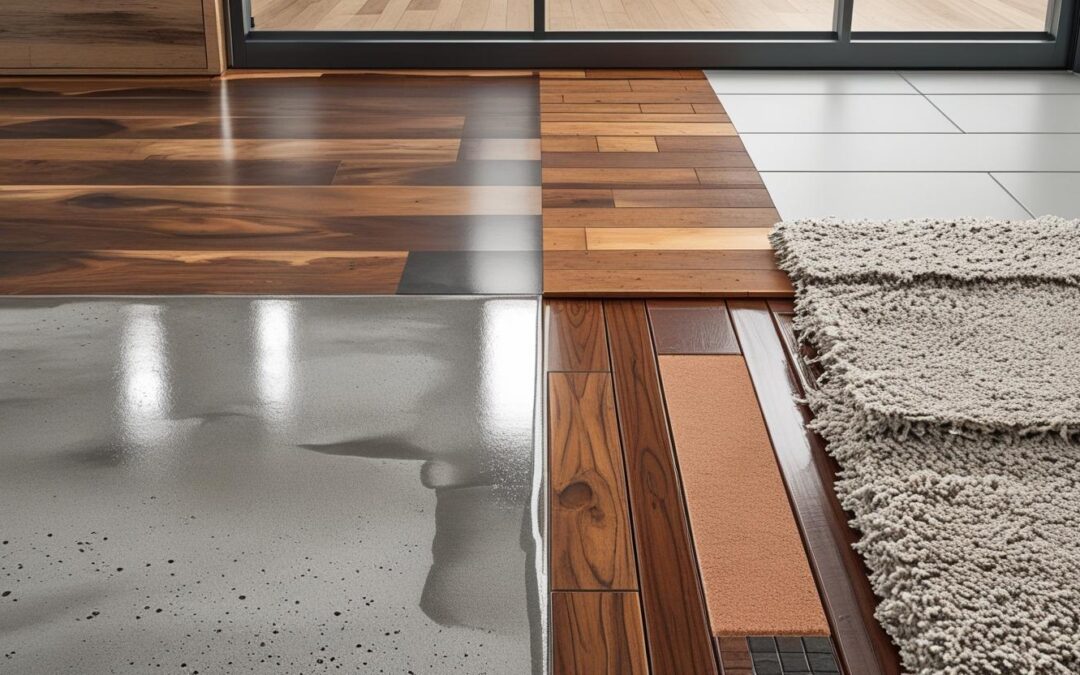Flooring is a critical investment that impacts functionality, appearance, and long-term maintenance costs. Epoxy flooring has gained popularity for its durability and versatility, but how does it stack up against alternatives like tile, vinyl, hardwood, or concrete? In this detailed comparison, we’ll analyze cost-effectiveness, longevity, maintenance, and more to guide your flooring choice.
What is Epoxy Flooring?
Epoxy flooring is a seamless, resin-based coating applied over concrete substrates. It creates a tough, glossy surface resistant to chemicals, stains, and wear. Available in various colors, patterns, and finishes (e.g., metallic, flake), epoxy is popular in garages, commercial spaces, and modern homes.
Comparing Epoxy to Other Flooring Options
Let’s break down how epoxy compares to four common flooring types: ceramic tile, vinyl, hardwood, and polished concrete.
1. Epoxy Flooring
- Cost: $3–$12 per square foot (including installation). Initial costs are moderate, but longevity reduces long-term expenses.
- Longevity: 10–20 years with proper maintenance; highly resistant to impact, chemicals, and abrasion.
- Maintenance: Easy to clean with soap and water; requires occasional resealing every 5–10 years.
- Aesthetics: Customizable with vibrant colors, patterns, or metallic effects; seamless look.
- Best For: Garages, warehouses, kitchens, and high-traffic areas.
- Drawbacks: Slippery when wet unless textured; requires professional installation for best results.
2. Ceramic Tile
- Cost: $5–$20 per square foot. Higher-end tiles or intricate patterns increase costs.
- Longevity: 20–50 years, depending on quality and traffic; grout lines may degrade faster.
- Maintenance: Regular cleaning; grout requires sealing to prevent staining.
- Aesthetics: Wide range of designs, from classic to modern; grout lines can disrupt seamless look.
- Best For: Bathrooms, kitchens, and entryways.
- Drawbacks: Prone to cracking under heavy impact; grout maintenance is labor-intensive.
3. Vinyl Flooring
- Cost: $2–$8 per square foot. Budget-friendly but varies by thickness and quality.
- Longevity: 5–20 years; less durable in high-traffic areas or under heavy loads.
- Maintenance: Simple to clean; susceptible to scratches and fading.
- Aesthetics: Mimics wood, stone, or tile; lacks the premium feel of natural materials.
- Best For: Budget-conscious spaces like basements or rental properties.
- Drawbacks: Not as durable as epoxy; may emit VOCs in low-quality products.
4. Hardwood Flooring
- Cost: $8–$25 per square foot. Exotic woods or custom installations drive up costs.
- Longevity: 25–100 years with refinishing every 7–10 years.
- Maintenance: Requires regular sweeping, polishing, and refinishing; sensitive to moisture.
- Aesthetics: Timeless, warm look; available in various species and stains.
- Best For: Living rooms, bedrooms, and high-end homes.
- Drawbacks: Expensive; prone to scratches and water damage.
5. Polished Concrete
- Cost: $3–$15 per square foot, depending on grinding and sealing complexity.
- Longevity: 10–20 years with proper care; susceptible to cracking if not sealed.
- Maintenance: Easy to clean but requires periodic resealing to maintain shine.
- Aesthetics: Sleek, industrial look; limited color options compared to epoxy.
- Best For: Retail spaces, lofts, or minimalist homes.
- Drawbacks: Cold and hard underfoot; stains easily without protective coatings.
Cost-Effectiveness Analysis
- Upfront Costs: Vinyl is the cheapest, followed by epoxy and polished concrete. Hardwood and tile are pricier due to material and labor costs.
- Long-Term Value: Epoxy and polished concrete offer excellent value due to low maintenance and durability. Hardwood lasts longest but requires costly refinishing. Vinyl and tile may need replacement sooner in high-traffic areas.
- Energy Efficiency: Epoxy and concrete retain heat well, potentially lowering heating costs. Hardwood and tile can feel colder, increasing energy use in colder climates.
Longevity Factors
- Traffic Levels: Epoxy excels in high-traffic areas due to its resistance to wear. Vinyl and hardwood may show signs of wear faster.
- Environmental Conditions: Epoxy and tile resist moisture, making them ideal for humid areas. Hardwood and vinyl are less suited for wet environments.
- Maintenance Commitment: Epoxy and polished concrete require minimal upkeep, while hardwood and tile demand regular care to maintain appearance.
Why Choose Epoxy?
Epoxy stands out for its balance of affordability, durability, and customization. It’s ideal for homeowners or businesses seeking a low-maintenance, long-lasting floor that can withstand heavy use. Unlike vinyl or hardwood, epoxy resists chemicals and stains, making it perfect for garages or industrial settings. Compared to tile, it offers a seamless surface without grout lines to clean.
Professional Installation Matters
Achieving a flawless epoxy floor requires skilled preparation and application. At Z Worx Construction, our team ensures proper surface prep, high-quality materials, and precise installation for a durable, stunning finish. We also offer expert guidance on choosing the right flooring for your needs.
Conclusion
Epoxy flooring offers a compelling mix of cost-effectiveness, longevity, and aesthetic versatility, making it a strong contender against tile, vinyl, hardwood, and polished concrete. By understanding your space’s needs and budget, you can choose the flooring that best suits your lifestyle. Ready to upgrade your floors? Contact Z Worx Construction for a free consultation and discover how our epoxy solutions can transform your space!
